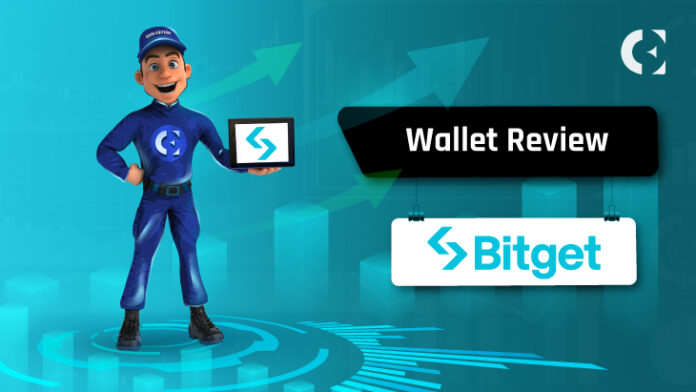Introduction
Bitget Wallet stands out as the ultimate Web3 multi-chain decentralized wallet, offering a secure and convenient trading experience tailored for all crypto users, including beginners.
With a proven five-year legacy, Bitget Wallet has earned the trust of over 12 million users across 168 countries globally. Its user-friendly features empower users to engage with decentralized applications and digital assets and fully embrace the opportunities provided by the Web3 ecosystem.
Established in 2018, Bitget Wallet aspires to be the premier gateway to the Web3 world. This multi-chain wallet seamlessly integrates a comprehensive suite of features within a single platform, including a trading platform, launchpad, NFT Market, OTC, DApp Browser, and more.
Formerly recognized as BitKeep, Bitget Wallet, Asia’s largest Web3 trading wallet, has forged strategic partnerships with industry leaders such as Bitcoin, Ethereum, TRON, BNB Chain, Solana, and Base.
In a strategic move in March 2023, Bitget Global, a prominent crypto derivatives trading platform, invested a substantial $30 million in BitKeep, acquiring a controlling stake. Following this, BitKeep underwent a transformative rebranding in August, emerging as Bitget Wallet.
Table of contents
Bitget Wallet Details
| Website | https://web3.bitget.com/ |
| Number of mainnets supported | 90+ |
| Number of users worldwide | 12 million users |
| Number of supported coins/tokens | 250,000 |
| Number of supported fiat currencies | 45 |
| Year founded | 2018 |
| Number of countries supported | 168 |
| Total swap trading volume | $8 billion |
| Ranking | Seventh by user base |
| Version | 8.8 |
| Platforms | Android, iOS, and browser extensions |
| Custodianship | Non-custodial |
| Languages supported | English, French, Spanish, Arabic, Hindi, Japanese, Korean, Indonesian, Portuguese, Russian, Turkish, Vietnamese, Chinese (simplified), and Chinese (traditional). |
| Price | Free |
History Overview:
Before adopting the name Bitget Wallet, the platform operated under the name BitKeep, founded in March 2018. It released an alpha version in May of the same year, securing a $2 million investment from Matrix Partners China.
In August 2020, BitKeep integrated DeFi functionality, marking a pivotal moment in the platform’s evolution.
The year 2021 witnessed significant milestones, including the launch of BitKeep Swap, cross-chain bridging, and BitKeep’s Chrome extension.
Building on its success, 2022 showcased remarkable growth with millions of dollars in investments and trading volumes. In March 2022, BitKeep Swap achieved a trading volume exceeding $5 million, with the daily transaction value of multi-chain swaps reaching $20 million. Around the same time, the NFT marketplace was launched.
May 2022 saw BitKeep raise $15 million in Series A funding, valuing the company at $100 million. In November of the same year, a secure asset fund was launched, safeguarding user assets with a fund of $1 million.
The year 2023 marked BitKeep’s transformation into Bitget Wallet, accompanied by the launch of Bitget Swap, the Bitget NFT marketplace, and an impressive user base exceeding 10 million worldwide.
Is Bitget Wallet Suitable for Beginners?
Bitget Wallet emerges as one of the best choices for beginners entering the Web3 realm. With all essential Web3 features seamlessly integrated into one platform, users can trust that Bitget Wallet caters to their needs.

Creating a wallet is a swift process, taking no more than a minute. Users can choose between the mobile application and browser extension versions. The initial steps involve creating a password and receiving a mnemonic phrase.
Users must secure their mnemonic phrase, as Bitget Wallet is a non-custodial wallet with no access to users’ assets in case of a lost mnemonic phrase.
Bitget Wallet boasts the capability to store over 255,400 cryptocurrencies across top chains, including Ethereum, Polygon, Binance Smart Chain, Avalanche, and Arbitrum.
The DApp browser facilitates easy access to a wide range of decentralized applications, allowing users to explore various applications within the DeFi sector.
Lastly, the NFT marketplace and DEX streamline the process of buying, selling, and trading digital assets, making these features ideal for beginners venturing into cryptocurrency and NFT trading.
Bitget Wallet Services:
Bitget Wallet:
Bitget Wallet stands out as Asia’s largest and one of the world’s leading all-in-one Web3 trading wallets. Offering a comprehensive suite of Web3 services, from non-custodial token management and token swaps to real-time market data, an NFT marketplace, and DApp browsers, Bitget Wallet caters to all the diverse needs of Web3 traders.
In 2023, Bitget Wallet achieved recognition as one of the top ten most popular hot wallets for crypto self-custody, securing the seventh position in terms of users on both browsers and mobile platforms.

Bitget Wallet redefines the standard for Web3 wallets by becoming the go-to wallet for all Web3 activities. The wallet boasts being the first wallet to introduce a decentralized exchange market aggregator, leveraging real-time blockchain data to offer users the best trading prices available.
As a decentralized and non-custodial Web3 trading platform, Bitget Wallet ensures seamless and secure management of digital assets. With support for over 90 blockchains, including EVM-compatible chains, customized mainnets, and testnets, Bitget Wallet automatically aggregates and consolidates assets and transaction records across these chains, eliminating the need for users to navigate different network ecosystems manually.
The “DeFi Portfolio” feature enhances the user experience by efficiently managing staked assets on various DeFi protocols. Additionally, the Watch-Only feature enables users to track specific addresses without importing private keys, providing real-time notifications of transactions and empowering informed decision-making.
Moreover, Bitget Wallet enables direct staking of ETH/USDT assets within the wallet, offering users diverse options to grow their asset portfolios while earning passive income and contributing to the decentralization of the blockchain.
NFT Marketplace:
Bitget Wallet boasts a leading NFT marketplace and aggregator that spans eight different blockchains, ensuring broad Web3 accessibility and diverse asset options for users.
This marketplace supports unrestricted NFT listings from third-party platforms and allows the purchase of NFTs using various cryptocurrencies. Multi-chain NFT management and trading are facilitated across several chains, including Ethereum, BNB Chain, Polygon, Klaytn, Arbitrum, Optimism, and Ethereum Classic.
Artists benefit from the ability to create, manage, and upload NFTs individually or in bulk within the Bitget Wallet NFT marketplace. The platform also offers a royalty program for creators, where income is provided by the seller during the sale process in the secondary marketplace.

The user-friendly interface of the NFT marketplace presents featured collections at the top, followed by NFT rankings. Users can filter NFTs based on chain, floor price, volume, sales, and owners.

Trading NFTs on the Bitget NFT marketplace is straightforward. On the landing page of the Bitget Wallet website, users can access the NFT tab, choosing between the “Creators” and “Users” interfaces. “Creators” enable artists to upload their NFTs, while “Users” empower traders to buy and sell NFTs.

Upon choosing a desired NFT, users can access detailed information such as the NFT number, owners, price, traits, contract, token standard, and mainnet. A notable feature is the ability for users to buy NFTs with any token on the same chain.
Post-purchase, users can find their NFTs under “My Assets” in the Users window on the main NFT marketplace website page on the desktop. To sell an NFT, users can tap on the specific NFT, prompting a sell option to appear.
Bitget Swap:
At the core of Bitget Wallet lies Bitget Swap, a robust and user-friendly trading feature supporting cross-chain transactions across nearly 30 mainnets. By consolidating liquidity from hundreds of decentralized exchanges, Bitget Swap provides users with optimal prices across the network, along with an extensive array of trading pairs and candlestick charts.

Bitget Swap excels in supporting cost-effective cross-chain transactions and gas borrowing services, striving to offer users the most convenient and comprehensive trading experience available.
With a range of innovative features, including gas-free trading, automatic slippage adjustments, multiple trading modes, and more, Bitget Swap stands out as an easily accessible yet powerful trading feature within Bitget Wallet.
Currently, Bitget Swap supports 90+ popular blockchains and over 25,000 coins, ensuring the broadest multi-chain trading options. Users can seamlessly swap different tokens from various blockchains in a single step, eliminating the need to change trading channels or undergo repeated authorization checks. This approach ensures a cost-effective and convenient method for users to perform their cross-chain transactions.
Bitget Swap’s versatility extends to various trading modes, including instant swaps, limit orders, futures trading leveraged from Bitget, and the user-friendly “Quick Buy” OTC service.
The “Quick Buy” service is an inclusive on-ramp feature that integrates six different third-party channels, such as MoonPay and Alchemy Pay, enabling users to purchase cryptocurrencies using fiat through diverse, accessible payment methods.
Users can directly buy and sell tokens through Bitget Wallet’s browser extension, performing essential functions like sending, receiving, swapping, and purchasing cryptocurrencies. For those interested in buying cryptocurrencies with fiat, this can be achieved through the “buy” options.

Bitget Wallet supports more than 40 fiat currencies, including United States Dollars (USD), Euro (EUR), Indian Rupee (INR), Russian Ruble (RUB), Japanese Yen (JPY), Chinese Yuan (CNY), South Korean won (KRW), and United Arab Emirates Dirham (AED).

After selecting a currency, users can choose from third-party channels such as Moonpay, Banxa, AlchemyPay, Tansak, and BG P2P, offering a variety of payment options from Apple Pay and Google Pay to Visa, MasterCard, and bank transfers.
DApp Browser:
Decentralized applications (DApps) operate autonomously through smart contracts on a decentralized blockchain. Bitget Wallet’s integrated DApp Browser showcases over 20,000 DApps spanning various sectors, including decentralized finance (DeFi), game finance (GameFi), non-fungible tokens (NFT), bridges, exchanges, mining, tools, social applications, and loans.
Users can seamlessly switch between mainnets while interacting with DApps, enjoying the convenience of staying updated on the latest and most trending DApps through the platform’s dynamic “Hot Searches” spotlight.

Security:
Bitget Wallet places a paramount emphasis on security, providing users with a trustworthy, secure, and reliable means to manage their digital assets. Operating on a decentralized and non-custodial model, Bitget Wallet ensures users have full control over their funds.
The platform has implemented a comprehensive 360° “GetShield” security strategy, encompassing integrated risk alerts for DApps and tokens, transaction approval checkers, compatibility with hardware wallets, and the use of Multi-Party Computation (MPC) wallets.
Protection Fund:
To further safeguard users, Bitget Wallet has instituted a risk protection fund. In the unfortunate event of asset loss due to issues originating from the platform, the protection fund, totaling $300 million, is deployed to ensure full asset protection.
This fund not only strengthens risk mitigation capabilities but also reassures users regarding the security of their assets and transactions. Users facing losses can easily apply to the protection fund within 30 days of the incident by contacting the platform through their support email.
Double Encryption Storage Mechanism (DESM):
Bitget Wallet employs the Double Encryption Storage Mechanism (DESM), a robust security feature designed for the encryption and storage of mnemonic and private keys. Multiple encryption algorithms, including message digest encryption, symmetric encryption, and asymmetric encryption, are combined to ensure the utmost safety of users’ assets and private keys.
The DESM algorithm’s encryption process involves steps such as users setting the transaction password, storage in the cloud with SHA256, and key calculation for symmetric encryption through SHA256. The final step includes encryption with the Advanced Encryption Standard (AES256), one of the most secure encryption algorithms available today.
Security Audit:
Bitget Wallet prioritizes security by collaborating with leading security firms such as Slowmist and Certik. Certik, Bitget’s security auditing partner, conducts comprehensive security audits for features like Swap and the NFT marketplace protocol.
This commitment to security extends to continuous engagement with third-party professional security auditing platforms, ensuring the ongoing fortification of security measures for user transactions.

Comprehensive Asset Storage Solution
Bitget provides users with MPC wallets and hardware wallet storage solutions to enhance platform security. MPC, or multi-party computation, distributes private keys across locations, minimizing the risk of compromise. The MPC wallet eliminates single-point failure threats, enhances security beyond traditional methods, and allows for company-level security and control sharing.
Additionally, Bitget supports the import of Keystone hardware wallets using QR code mode, offering an offline solution for wallet asset management. Keystone hardware wallets stand out due to their advanced security features, including three secure element chips, biometric authentication, and offline transaction signing.
Comprehensive Trading Environment Testing
In collaboration with the security service platform Go+, Bitget Wallet identifies malicious addresses and DApps through the secure address library. This collaboration bolsters Bitget Wallet’s safety, security, and privacy features, preventing asset losses caused by theft, blackmail, malicious mining, and hidden contracts in malicious addresses or DApps.
Integration of Flashbots
The integration of Flashbots on Bitget Swap is instrumental in enhancing overall transaction privacy and security. Flashbots mitigate negative externalities posed by Maximal Extractable Value (MEV) on the Ethereum blockchain, contributing to a more secure and private trading environment within Bitget Swap.
Pros and Cons
After carefully examining the wallet, the following table lists the advantages and disadvantages:
| Pros | Cons |
| User-friendly interface | The browser extension has fewer features than the mobile version |
| A wide array of cryptocurrency and fiat support | |
| Integrated swap with auto finding the best DEX with best prices to swap in real-time | |
| Efficient cross-chain trading | |
| Extra security features | |
| Educational resources | |
| Global reach and large active user base |
Final Score
| Services offered | 4 |
| Variety of cryptocurrencies | 4 |
| Security | 4 |
| Review score | 4 |
Summary
In conclusion, Bitget Wallet stands out as a comprehensive crypto wallet, offering robust security features and a diverse range of Web3 activities within a unified platform. With a simple user interface catering to beginners and advanced users, Bitget Wallet allows users to seamlessly buy, swap, and trade cryptocurrencies.
Notably, the platform supports NFT trading and provides access to over 20,000 DApps across various sectors. Boasting a global reach and a substantial user base exceeding 10 million, Bitget Wallet is a popular choice for cryptocurrency enthusiasts.
Additionally, the platform’s commitment to user education is evident through its academy, which provides valuable learning guides for users.
FAQs
Bitget Wallet is part of the crypto exchange Bitget, and the company works out of regional hubs globally.
Bitget Wallet supports more than 40 cryptocurrencies, including but not limited to Bitcoin (BTC), Ethereum (ETH), Polygon (MATIC), Arbitrum (ARB), Solana (SOL), Tether (USDT), USD Coin (USDC), Pepe (PEPE), PancakeSwap (CAKE), Tron (TRX), and many more.
Bitget Wallet prioritizes security with a comprehensive 360° “GetShield” security strategy. This includes integrated risk alerts for DApps and tokens, transaction approval checkers, compatibility with hardware wallets, and the use of MPC wallets.
No, Bitget Wallet is a decentralized, non-custodial wallet. This means that users have complete control over their digital assets, and the wallet does not hold custody of users’ funds.
Yes, users can buy cryptocurrencies with fiat currencies using Bitget Wallet. The wallet supports more than 40 fiat currencies, including United States Dollars (USD), Euro (EUR), Indian Rupee (INR), Russian Ruble (RUB), Japanese Yen (JPY), Chinese Yuan (CNY), South Korean won (KRW), and United Arab Emirates Dirham (AED).
Users can choose from various third-party channels, such as Moonpay, Banxa, AlchemyPay, Tansak, and BG P2P, and can use payment methods like Apple Pay, Google Pay, Visa, MasterCard, and bank transfers.
Disclaimer: The information presented in this article is for informational and educational purposes only. The article does not constitute financial advice or advice of any kind. Coin Edition is not responsible for any losses incurred as a result of the utilization of content, products, or services mentioned. Readers are advised to exercise caution before taking any action related to the company.










